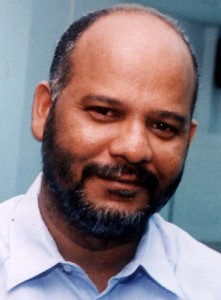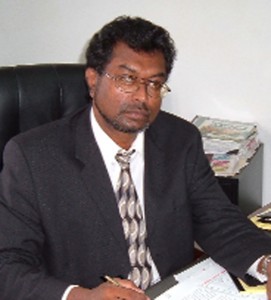Three bills, green-lighting the use of audio-visual links to take evidence, plea bargaining and paper committals to strengthen the criminal justice system were passed by the National Assembly yesterday,
The government passed the Evidence (Amendment) Bill 2008 without the support of the opposition, which tried unsuccessfully to attach an amendment; the Criminal Law Procedure (Amendment) Bill 2008 was amended and passed with opposition support; while the Criminal Procedure (Plea Bargaining and Plea Agreement) Bill 2008 was passed with the full support of all the parties.

PPP/C MPs characterised the bills as a part of the government’s drive to make the dispensation of justice more efficient, while their counterparts in the PNCR-1G and AFC seats welcomed the initiative to strengthen the law and speed up the delivery of justice but expressed serious reservations about what they called repressive aspects of some of the provisions.
Home Affairs Minister Clement Rohee said the laws are part of an effort by the government to ensure that the criminal justice system operates in a much more efficient manner, using best practices adopted from within the region and further afield. “We cannot stand still,” he said, “work is moving at a rapid pace.”
Nevertheless, the passage of the Evidence (Amendment) Bill 2008 proved prickly as the government and opposition MPs clashed over its constitutionality, whether the provisions would take away rights from accused persons and the government’s readiness to sustain a programme. Opposition members described some aspects of the law as oppressive, while raising concerns about their true motives. The new law will allow the introduction and use of audio visual links for the taking of evidence by courts, including the testimony of witnesses and experts overseas who are vital to proceedings. The law was based on a decision by Caricom Heads of Government at a special security conference in April this year, where it was decided that it was necessary to introduce video evidence in criminal proceedings and in identification parades of suspected persons. A four-person minimum on the composition of ID parades proposed by the law was also a sore point between the government and opposition.

While there was agreement on the usefulness of employing the technology in the case of witnesses who are overseas as well as in cases involving children, the proviso for using it to enable the appearance of detainees before the courts for bail hearings was a huge issue for the PNCR MPs. Attorney General Doodnauth Singh said it would also reduce the risks of security involved in escorting and transporting and securing persons in the custody of the court. The escape of now dead fugitive Jermaine “Skinny” Charles from a holding cell was cited as one of the incidents that might have been preventable if the law were in place. He emphasised that the decision to utilise the technology ultimately rests with the court, which has to be satisfied with any application. He said this was one of the safeguards.
But PNCR MP Clarissa Riehl worried that it might be used to keep persons detained; a worst case scenario that outlined which was later called paranoid. Riehl and later PNCR-1G MP Debra Backer both drew attention to the incidents in which prisoners have been abused to support their concerns.
An amendment in Riehl’s name sought to limit the application of the programme to witnesses outside of Guyana, but it was rejected by the government. They were also worried about the logistics of the venture and whether it would compromise privileged exchange between attorneys and clients, a view echoes by AFC MP Khemraj Ramjattan. He also argued that the law was in violation of Article 144 of the Constitution, which speaks about the right to be present at hearings. He said the party supported the use of new technology but not at the expense of basic rights. He also raised doubts about how the government would implement the law when most courts are run-down and magistrates and court staff lack basic tools which he felt should be addressed before audio visual links. “The courts are deficient of basic needs,” Ramjattan declared, questioning whether the government is prepared to develop infrastructure.

Human Services Minister Priya Manickchand, however, said the law is timely and relevant, promising a more swift and efficient delivery of justice. She said it would protect witnesses from intimidation. She also said the crucial issue in the case of detainees was the redefinition of “present” carved out by the law, thereby not violating any of their basic rights. Rohee agreed, while also dismissing claims that the provisions are unconstitutional. He said too that the courts would ultimately be responsible.
Paper committal
There was less conflict over the passage of the Criminal Law (Procedure) (Amendment) Bill 2008, which will vest in Magistrates the power to commit accused persons to trial in the High Court if a prima facie case is made out based on written instead of oral evidence. The paper committal law, which would also empower Magistrates to discharge accused persons, has been formulated to make the committal procedure more efficient, saving the court time and costs by creating an alternative to protracted preliminary inquiries (PI).
The bill, which was passed with an amendment after a procedural hiccup, was welcomed as a long overdue reform, although there was serious concern among opposition about the possible bottlenecks it would create in the High Court.
A practising lawyer, PNCR MP Basil Williams welcomed the law as a solution to PIs that run for years. He cited the case of one of his own clients, Quincy McLennon, who was charged for an offence in 2004 and was only committed to stand trial this year. McLennon was 16 when he was charged and despite the presumption of innocence Williams said the system has seen to it that he has grown up behind bars. He acknowledged that paper committals would make the administration of justice more efficient, but cast doubt on its impact on delays in the lower and superior courts. In the vein, he urged that the government consider implementing timeframes to ensure that cases are dealt with expediently. Ramjattan, also an attorney, welcomed the bill but said it was ten years overdue. He also supported Williams’ concerns about the bottleneck that could be created by the increased number of referrals to the High Court, which is not fully staffed to manage the caseload in a reasonable time. He said there is need to address the shortage of judges to help with the adjudication. PPP/C MP Anil Nandlall, while allowing that some of Williams’ concerns were valid, said the reform process had to begin somewhere. Rohee agreed, adding that the Criminal Justice Programme that is to be launched today would address some of the concerns about capacity building and institutional strengthening. “We recognise there are issues in the law that need to be addressed but we have to start somewhere and the Magistrate’s Court is a good place to start,” he said.
Landmark
The Criminal Procedure (Plea Bargaining and Plea Agreement) Bill 2008, which will formalise plea agreements in law, was as close to unanimity as the proceedings got. When enacted, it will allow for the Director of Public Prosecutions (DPP) to arrange plea agreements for the speedy disposal of cases.
Rohee described the bill as a landmark piece of legislation. He assured that the function of the court would not be usurped at any stage of the process. Backer acknowledged it as one of the most progressive laws the government has introduced. At the same time, she pointed to areas that need to be addressed, citing mandatory sentencing laws that might prevent flexibility in plea bargaining. She used the mandatory sentences prescribed for some narcotics offences as an example. “If the law does not allow flexibility in sentencing it nullifies the potency of plea bargaining,” she said. Backer also drew attention to the possibility of guilty pleas being invoked as evidence in civil suits and suggested the adoption of reservation clauses as obtains in the US. PPP/C MP Odinga Lumumba, who returned to active parliamentary duty after recovering from an accident, agreed with Backer on the need to look at mandatory sentences, while fellow PPP/C MP Nandlall noted that it would build on the success of court-sponsored mediation. He explained that the law would essentially formalise a practice that already exists in the lower and higher courts, and would help to reduce overcrowding in prisons. He said while maximum penalties would not be enforced in plea bargain arrangements, it would allow the criminal justice system to work. Victims would also be protected from attending drawn out hearings that would subject them to relive sometimes painful experiences. Williams, meanwhile, grudgingly admitted that it was a bill no one could find fault with, though he later said that it could have gone further; a contradiction that delighted the government benches.
According to the explanatory memorandum, the plea bargaining law seeks to reward a person who has entered into a plea agreement and is cooperating with law enforcement authorities or whose cooperation is beneficial to the administration of criminal justice. There are also safeguards to prevent prosecutors from inducing accused persons to make plea bargains, while also ensuring that the views of the victim or a relative of victims are sought where practicable before arrangements are concluded. The law will also stipulate that a judge or magistrate may reject a plea agreement if he/she considers it is not in the interest of justice.
Today’s sitting of Parliament is to deal with several contentious pieces of legislation: one dealing with wiretapping and the other with registration of mobile phone SIM cards among other things.





